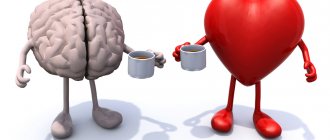The effect of coffee on the heart
The benefits and harms of coffee for the heart are a topic of frequent discussion among doctors. This drink contains caffeine, which can have positive and negative effects on the body.
Positive Impact Aspects
If a person drinks natural coffee rather than instant coffee, then moderate consumption will be beneficial. It has the following properties:
- saturates the body with magnesium and potassium . These are microelements vital for the heart muscle;
- lowers cholesterol levels;
- dilates coronary vessels . Due to this, the functional activity of the myocardium increases;
- prevents the development of heart failure and heart attack;
- removes toxins and fights infections . Caffeine is used in medicine for certain infectious pathologies, as well as when it is necessary to neutralize the effects of sleeping pills, narcotic substances and poisons;
Coffee stimulates brain activity. Affects mental and physical activity.
Is coffee bad for your heart?
Coffee is harmful when consumed excessively. The drink has the following effects:
- dehydrates . Has a diuretic effect. Due to this, the tone of the heart muscle decreases;
- washes away calcium and a number of other microelements necessary for the full functioning of the cardiovascular system;
- leads to exacerbation of existing diseases;
- increases blood pressure . Therefore, it is not recommended for hypertensive patients.
Heart benefits, healthy dose?
This aromatic drink certainly attracts the attention of gourmets with its invigorating effect. A positive effect on brain function has also been noticed. In addition, the drink has a number of positive qualities:
- Useful for hypotension. In hypotensive patients, with regular use of this drink, their general well-being improves, headaches go away, drowsiness disappears, lethargy, chills and nausea disappear. The main thing is to drink in reasonable quantities.
- It is an excellent accelerator of metabolic processes in the body.
- Normalizes and balances the activity of the endocrine system.
- Improves blood flow. Intensive blood circulation occurs throughout the body, due to this the general state of health is normalized.
- Activity appears and performance improves.
- The aging of the body slows down. Organs operate in a balanced and precise mode.
- The likelihood of cancer is reduced.
- Digestion improves.
- Vitamins PP, B1 and B2 missing in the body are replenished.
- Improves the absorption of microelements such as manganese, iron and phosphorus.
Important! Natural grains are endowed with all these positive qualities. As for instant drinks, they no longer contain the amount of nutrients and microelements that the body needs. In addition, instant drinks are significantly inferior in taste to natural ones.
The dose of a natural drink that will have a positive effect on cardiovascular activity is 2 - 3 cups per day, depending on the person’s health condition. A strong body will not be harmed, and even benefited by consuming up to 400 mg. caffeine For pregnant women, the safe caffeine limit is 300 mg. Do not forget that caffeine is also found in tea, so when calculating the norm, it is simply necessary to take this into account.
The benefits and harms of different coffee drinks
The effect of coffee on the heart largely depends on what kind of drink is consumed. It is recommended to give preference to natural black. The best additions to it are spices and milk.
Drinking drinks made from green, unroasted grains is less harmful to the body. Sometimes doctors recommend choosing a decaffeinated product.
Instant coffee will be especially harmful. It contains a lot of dyes, aromatic and flavoring additives. Therefore, it has a negative effect on the body in general and the cardiovascular system in particular.
When brewing espresso, you should avoid prolonged contact of coffee powder with water. Otherwise, the caffeine concentration will be higher. It is best to prepare it in a coffee machine.
Can coffee make your heart hurt?
As a rule, coffee causes heart pain in people suffering from angina, heart failure and hypertension. After drinking a shot of strong espresso, a pressing pain appears in the chest area.
True, such changes can be observed in an absolutely healthy person. The causes of heart pain from coffee are as follows:
- coffee drinks were not consumed for a long time. When receiving an unusually large dose of caffeine, the pulse quickens and chest pain appears;
- espresso was drunk under stress , with insomnia, chronic fatigue or after intense physical activity;
- the drink is combined with nicotine. Most often, unpleasant symptoms are observed in the morning, when drinking espresso on an empty stomach.
Can healthy people have heart problems after drinking coffee?
For a long time, controversy surrounding the usefulness of coffee continued. Medicine did not recognize it as a healthy drink and believed that it had a strong effect on the nervous system. They wrote that after drinking coffee, sleep disturbance occurs, and the person becomes restless. Against this background, blood pressure rises, which leads to pain in the heart.
Modern scientists, studying the properties of coffee, have come to the conclusion that the harm of coffee on the human body is exaggerated. Moreover, in moderate quantities, coffee provides the following benefits:
- tones the body, increasing performance;
- destroys free radicals because it is an antioxidant;
- relieves headaches;
- benefits the functioning of the liver;
- protects against cancer;
- normalizes the functioning of the endocrine system;
- supplies the body with vitamins and microelements.
How to get rid of pain
To eliminate pain, you need to adhere to the following recommendations:
- ensure air flow by opening windows and doors in the room;
- take a semi-lying position or sit down;
- breathe deeply, evenly;
- Taking small sips, drink at least half a liter of plain water. Due to this, the concentration of the natural stimulant will decrease.
As a rule, a quarter of an hour after performing these actions, the condition returns to normal. True, it is impossible to immediately begin active actions. It is recommended to sleep for about half an hour and relax.
Why does your heart beat faster and what to do?
Caffeine is a substance that acts on the nervous system as a powerful stimulant. When it enters the body, blood pressure increases. At the same time, adrenaline forces the heart muscle to contract faster and stronger. This is why your heart rate increases after drinking coffee.
In addition, a rapid pulse is due to the following reasons:
- drank more than five drinks per day;
- excessive strength of the drink;
- the presence of cardiac pathologies.
If a person does not have heart problems, such changes should not cause concern . The following recommendations will help to minimize their manifestation:
- exercise daily. It will be enough to do just a few simple exercises;
- give up alcohol;
- get rid of excess weight;
- Do not combine espresso with nicotine.
In this case, palpitations will be extremely rare and will not lead to serious health problems. If such changes are observed frequently, you need to seek help from a cardiologist and undergo a comprehensive examination.
Use for heart disease
Scientists continue to argue to this day about how coffee affects the heart in the presence of various diseases. If previously it was believed that heart patients should completely avoid this drink, now there is no strict prohibition. Avoid espresso only in rare cases.
For hypertension
Not so long ago, doctors categorically forbade drinking coffee drinks for hypertension. It was recommended to replace them with decaffeinated ones. However, recent studies have shown that even decaffeinated coffee increases blood pressure.
Accordingly, a natural stimulant has nothing to do with it. On the contrary, one serving of espresso per day will not cause harm, but will prevent sudden jumps in blood pressure.
Is it possible to drink coffee if you have heart arrhythmia?
Even with atrial fibrillation, drinking coffee is not strictly prohibited. According to statistics, people who do not drink coffee drinks are hospitalized more often with this disease than avid coffee drinkers. In addition, if the heartbeat is very rare, using natural espresso will help normalize the heart rhythm.
For heart failure
Clinical studies have shown that caffeine is not harmful to the heart in this disease. Therefore, you shouldn’t give up a serving of your favorite espresso.
The main thing is to drink no more than two cups a day. Abuse will not be tolerated.
Is it possible to drink coffee with tachycardia?
The coffee drink itself is not capable of triggering tachycardia. However, against the background of its use, the following changes are possible:
- increased heart rate;
- feeling of lack of air;
- darkness in the eyes;
- wobbly legs;
- intense sweating.
Naturally, if such symptoms appear, caffeine-containing drinks should be avoided.
After bypass
After coronary artery bypass surgery, a person needs to adhere to a gentle diet for a long time. True, only alcohol is strictly prohibited. Most doctors are loyal to coffee. If a person really wants to drink his favorite drink, then he shouldn’t deny himself this. The main thing is that it is not strong. It is advisable to add milk to it.
Is it possible to drink coffee if you have angina?
Caffeine does not provoke angina, but if this pathology already exists, the natural stimulant will reduce the gaps in the arteries pumping blood. As a result, the heart muscle will experience oxygen deficiency and increase the risk of coronary spasm.
Therefore, you should not drink coffee if you have angina. It should be replaced with chicory or other non-caffeine drinks.
After a heart attack
After a heart attack, the body does not need the strong invigorating effect of caffeine. Long rest is recommended. True, if a person is accustomed to small portions of espresso, drinking one cup a day is not prohibited. The main thing is to mix it in equal proportions with milk. In this case, positive emotions will be received, which are extremely important for a speedy recovery.
For ischemic disease
At the end of the last century, it was believed that coffee for cardiac ischemia is strictly contraindicated. True, recent studies have proven that this disease occurs with equal frequency in avid coffee drinkers and people who do not drink coffee drinks at all.
If your blood pressure is significantly reduced due to coronary artery disease, a serving of espresso will only bring benefits. It is not dangerous and there will be no harm from its use.
Is it possible to drink coffee if you have heart problems?
Caffeine increases cardiac activity, stimulates the vasomotor center, increases heart rate and briefly increases blood pressure. These changes are not dangerous for the body of a healthy person. Why can a healthy drink become dangerous?
People with heart problems should either give up the drink or drink no more than 2 cups per day
Due to these properties, people with heart rhythm disturbances (tachycardia, atrial fibrillation) should consume the drink with caution.
For arrhythmia
Arrhythmia occurs due to disruption of the heart muscle; drinking caffeine-containing drinks does not have any effect on the disease.
For arrhythmia, it is better to add milk to coffee to reduce its effect on the body
Rules for use for arrhythmia:
- Dilute the drink with milk or cream.
- Do not drink on an empty stomach. This can cause headaches and weakness during the day.
- Refuse the drink at times when the body is weakened: during stress, illness and lack of sleep.
If you regularly drink coffee, it is not recommended to sharply reduce your usual dose. This will cause stress in the body, which can cause an unreasonable increase in blood pressure and anxiety attacks throughout the day.
For angina pectoris
Angina is a narrowing of blood vessels that slows blood flow to the heart. If you have an attack, drink a glass of water and relax. It is not recommended to use coffee as a medicine; it only removes fluid from the body.
If you have angina, you need to monitor your condition and not increase the maximum permissible dose of coffee (700 ml per day)
There is no need to completely give up the drink. Rules for use by a person who suffers from angina pectoris:
- Take the drink with plenty of water.
- Don't drink in stressful situations.
- No more than 2-3 cups during the day.
If after drinking coffee you feel a nagging chest pain or weakness, it is better to take a break for a day and replace the drink with something else.
In what cases is coffee intake limited?
In general, moderate consumption of caffeinated drinks does not pose any risk. True, in certain cases you need to refuse them or drink in limited quantities:
- period of bearing a child. The development of the fetus directly depends on how nutrients are supplied through the placenta. With frequent exposure of caffeine to the blood, vasospasm occurs and fetal hypoxia develops. This increases the risk of congenital pathologies;
- systemic atherosclerosis in older people. The affected vessels contract under the influence of the alkaloid, the plaques rupture, and free particles enter the bloodstream. The most dangerous consequences of these changes are considered to be ischemic stroke and myocardial infarction;
- angina pectoris;
- ulcer and gastritis.
Can this drink stop your heart?
Purely theoretically, coffee can stop the heart. True, you need to drink a huge amount of it. A fatal outcome is possible if a person drinks espresso all day and night, taking very short breaks. Death occurs after at least 70 cups of this drink. Naturally, it is almost impossible to drink such an amount of liquid containing caffeine.
Coffee can have a positive effect on the body even in the presence of a number of heart pathologies. The main thing is to consume it in moderation. Abuse will negatively affect the condition and can lead to aggravation of the situation.
Can coffee “plant” the heart?
Doctors rely on the results of a large-scale study conducted at Harvard University. It has been found that people who drink a cup of coffee a day every day are much less likely to develop cardiovascular diseases. The drink cannot improve the heart.
In minimal doses, coffee increases productivity, stimulates the central nervous system, improves vascular tone, and relieves fatigue. Caffeine improves blood flow not only to the heart, but also to the brain. If a person is healthy, the drink will have a positive effect on his general condition.
A moderate amount will not harm the body. The only question is the volume of caffeine-containing drinks consumed during the day. You can reduce your drink intake to two cups a day and enjoy its taste and aroma every day. We also recommend reading how to replace your morning coffee and the pros and cons of decaffeinated coffee.











